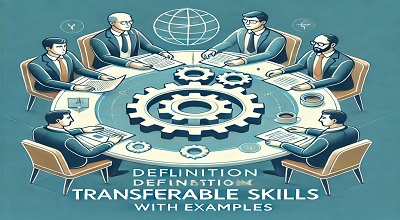Transferable Skills
Transferable skills are abilities and qualities that can be applied across various roles, industries, and situations. These skills are not specific to any particular job or field but are valuable in a wide range of contexts. Developing transferable skills is essential for career growth, adaptability, and success in today’s dynamic job market. Below are some key transferable skills along with examples to illustrate their importance and applicability:
Communication Skills
Communication skills involve the ability to convey information clearly and effectively, both verbally and in writing. These skills are crucial in any professional setting, whether it’s interacting with colleagues, clients, or stakeholders. Examples of communication skills include:
Presenting ideas in meetings
- Writing clear and concise emails
- Active listening during conversations
- Providing constructive feedback to team members
Leadership Skills
Leadership skills involve the ability to inspire, motivate, and guide others toward achieving common goals. These skills are valuable for individuals in managerial positions as well as those working in team environments. Examples of leadership skills include:
- Delegating tasks effectively
- Resolving conflicts within a team
- Setting a positive example for others
- Making decisions under pressure
Problem-Solving Skills
Problem-solving skills involve the ability to analyze complex situations, identify solutions, and make informed decisions. These skills are essential for overcoming challenges and driving innovation in the workplace. Examples of problem-solving skills include:
- Analyzing data to identify trends
- Developing creative solutions to issues
- Implementing strategies to improve efficiency
- Adapting to unexpected changes in a project
Time Management Skills
Time management skills involve the ability to prioritize tasks, set goals, and efficiently utilize time to meet deadlines. These skills are crucial for maintaining productivity and achieving work-life balance. Examples of time management skills include:
- Creating a daily schedule to plan tasks
- Setting realistic deadlines for projects
- Using tools like calendars and task lists to stay organized
- Prioritizing tasks based on importance and urgency
Teamwork Skills
Teamwork skills involve the ability to collaborate effectively with others, contribute to group goals, and communicate openly within a team setting. These skills are vital for fostering a positive work environment and achieving collective success. Examples of teamwork skills include:
- Supporting colleagues in achieving shared objectives
- Respecting diverse perspectives within a team
- Offering help and guidance to team members
- Celebrating team accomplishments together
Adaptability Skills
Adaptability skills involve the ability to adjust to new situations, learn new tasks quickly, and thrive in changing environments. These skills are essential for staying resilient and flexible in the face of evolving circumstances. Examples of adaptability skills include:
- Embracing new technologies and tools in the workplace
- Responding positively to feedback and constructive criticism
- Flexibly adjusting priorities based on changing needs
- Taking on new responsibilities outside of one’s comfort zone
Conclusion
In conclusion, transferable skills play a crucial role in shaping individuals into versatile and valuable professionals. By developing and honing these skills, individuals can enhance their employability, excel in diverse roles, and navigate the complexities of today’s job market with confidence and competence.
